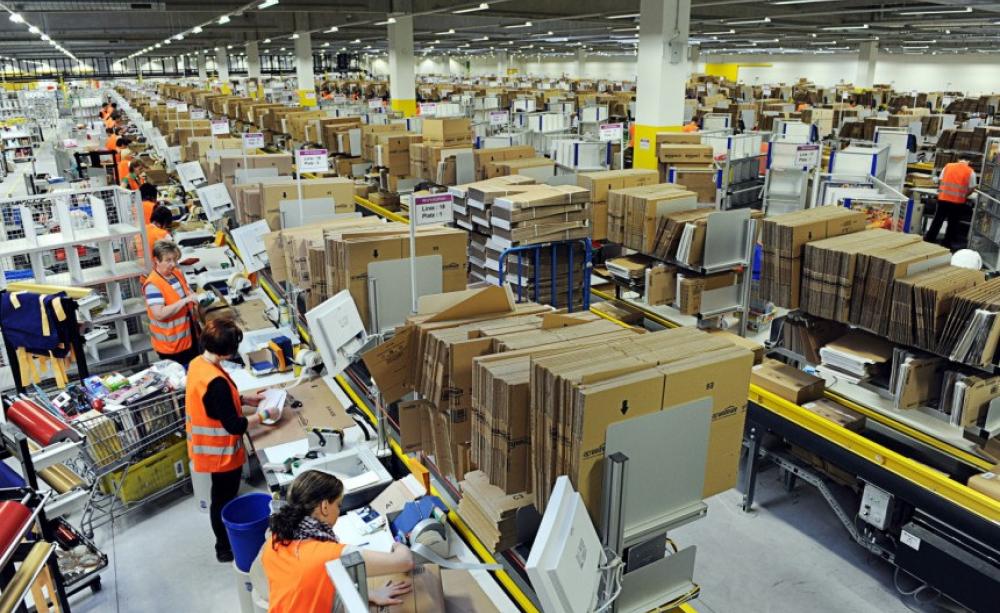Amazon caused a scandal in Germany when it was revealed that every day goods such as refrigerators, washing machines, cell phones and furniture, worth several tens of thousands of euros were being destroyed.
The UK high street is in a state of flux as it contends with the dilemma of how to stay relevant in an age when more of us than ever are making purchases online.
This shift in shopping habits, and the recent closure of a number of household name stores, has been dubbed ‘the death of the high street’ with the phenomena of internet shopping often cast as the villain of the piece.
Online shopping currently accounts for 17.1 percent of all UK retail, and despite what the headlines might lead us to believe, it isn’t all bad; particularly if you make your purchases via an ethical, internet based, store.
Toxic chemicals
Several studies have compared the greenhouse gas emissions from online and traditional bricks-and-mortar shopping - with the consensus that online shopping is, on average, significantly better.
The major reason being transport – deliveries going in the same direction can be combined into one load, which is more efficient than lots of individual journey’s to the shops.
The challenge though is how to avoid the online behemoth that is Amazon: it currently has a 33.5 percent - and growing - market share of all the online shopping in the UK, and now their expansion into food delivery, web cloud services, streamed television and the production of electronics, means that they are more likely than ever to infiltrate daily life.
They may have recently announced a pay rise for some workers, but the regular expose’s about tax avoidance, their shocking environmental record, poor workers’ rights and warehouse conditions means they’re still far from an ethical option.
In fact they score a worst Ethical Consumer rating across almost all of the policy areas that we rate, from environmental reporting, to its toxic chemicals policy.
Popular entertainment
Earlier this year Amazon caused a scandal in Germany when it was revealed that every day goods such as refrigerators, washing machines, cell phones and furniture, worth several tens of thousands of euros were being destroyed, despite often still being usable, functional and sometimes even new products.
Amazon responded and said it is trying to destroy as few goods as possible by reselling through Amazon Warehouse, donations, recycling and delivery to second-hand sellers.
Klaus Töpfer, a former federal minister of the environment, described Amazon’s procedure as “irresponsible” and Greenpeace called for action: “We need to implement a law on banning the waste and destruction of first-hand and usable goods”, demanded Kirsten Brodde.
Amazon caused a scandal in Germany when it was revealed that every day goods such as refrigerators, washing machines, cell phones and furniture, worth several tens of thousands of euros were being destroyed.
And now online shopping is no longer restricted to the purchasing of goods. Services such as Amazon Prime Video, also have environmental consequences which many believe Amazon are failing to properly address.
Prime is now one of the most popular entertainment channels in the UK, and in June this year secured the rights to stream a number of Premier League matches for three seasons from 2019.
Renewable powered
Paying to stream on-demand TV, films and sports coverage has become the norm, and the amount of internet traffic taken up by streaming services has dramatically increased.
Climate News Network stated, in 2017, that: “Video streaming to internet-enabled TVs, game consoles and mobile devices already accounts for more than 60 percent of all data traffic – and the latest forecasts suggest this will rise to more than 80 percent by 2020”.
And this matters, because to serve the ever-increasing demand for data, more and more data centres are needed, and they require a huge amount of energy to operate.
Some have predicted that data centres could account for 13 percent of global energy demand by 2030. If companies do not commit to powering these centres using renewable sources of energy, then this could significantly drive up demand for fossil fuels.
The Greenpeace ClickingClean report annually evaluates the environmental performance of tech companies and puts pressure on them to use renewables. It has seen some success, pushing companies – such as Apple and Google– towards 100 percent renewable powered data centres: in 2017 Apple achieved 83 percent powered by renewable energy, compared to Amazon’s poor 17 percent.
Internet giant
However, the old data centre model is being replaced, with more organisation’s preferring to outsource their own storage needs to cloud computing services. One company dominates this market, Amazon Web Services (AWS), which, as the name suggests, is owned by Amazon.
Amazon Web Services controls around 45 percent of the world’s cloud-computing capacity, and over the last few years, Greenpeace has been critical of AWS’s lack of transparency when it comes to the energy used in its data centres.
Greenpeace says it is particularly concerned by the fact that Amazon is building many of its new data centres in states like Virginia, which are largely powered by coal.
While Greenpeace has managed to collect data from Amazon regarding the types of energy used, the organisation strongly criticises AWS for its continued failure to divulge the amount of energy it is using to both the public and its clients.
The Ethical Consumer product guide to streaming services flagged Flix Premiere and Mubi, both independently owned film-streaming services, as alternatives to Amazon and Netflix (which uses Amazon web services), but the dominance and reach of the internet giant, means consumers need to be more alert than ever if they want to avoid Amazon in their daily lives.
Bridge that gap
So, despite all the negative press around their social and environmental practices, why do so many consumers still turn to the likes of Amazon?
A quick poll provided answers: when you’re in a hurry, need something specialist, and price is a consideration then finding an ethical alternative isn’t always that easy.
At Ethical Consumer we are trying to bridge that gap, now in the sixth year of its Amazon Boycott, we have published a number of product guides to help consumers avoid the online giant.
One of these guides rates 24 websites, which offer a variety of products marketed as ethical. We’ve also published guides to bookshops, e:readers, tablets and as mentioned above streaming services.
You can learn more about the ethical companies in these guide and more about Amazon on the Ethical Consumer website.
This Author
Tim Hunt is a co-editor at Ethical Consumer.







